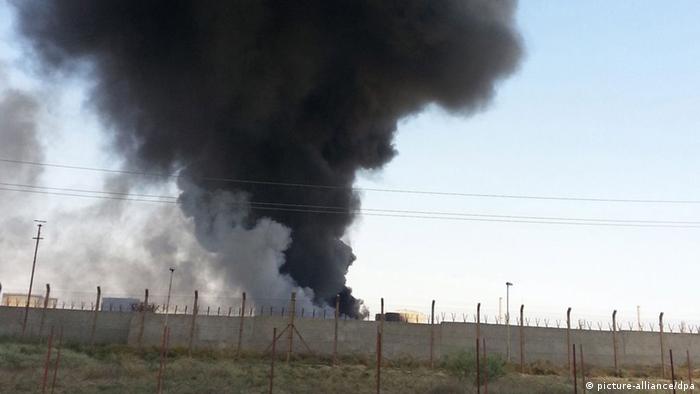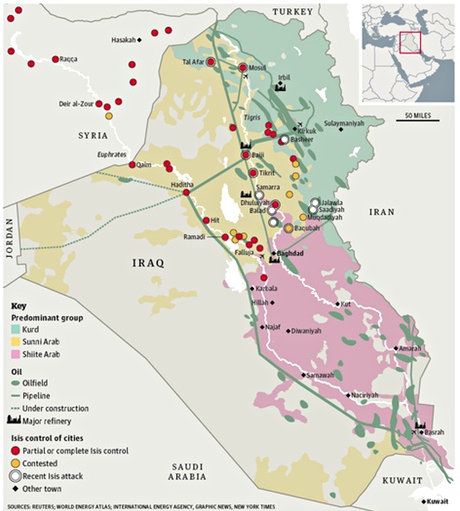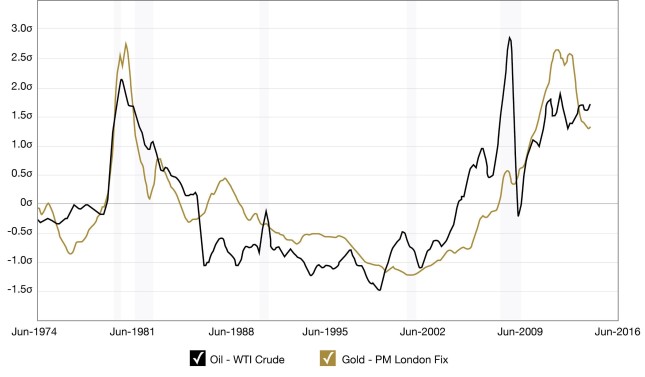ISIS militants are selling oil from their conquered territories, further
fueling tensions in the region. This has caused uncertainty on the
world market, but could also lead to a drop in global oil prices.Source: ISIS, oil and war
Submitted by Andrew McKillop, 12Aug2014
Outside the US and inside the Middle East warnings of this threat have multiplied for several months but Obama and his administration “didn't want to know”. We therefore have to ask if his administration wants a run-up of world oil prices as in 2008, which helped create or trigger the 2008 financial crisis which endures today?
Submitted by Andrew McKillop, 12Aug2014
Oil and Humanitarian War
Portraying American
intervention in Iraq as a purely humanitarian effort, president Obama is
following the same script he read in March 2011 for Libya, when he justified American
intervention as an effort to prevent a civilian massacre in Benghazi. In 2011
he addressed the American nation and said the US was acting militarily,
without “boots on the ground”, as a response to “brutal repression and a
looming humanitarian crisis.”
Obama was much too polite to
mention oil at the time, and again today when it concerns Iraq. Libya in 2011
was the world’s sixteenth-largest world producer and was supplying about 19.5%
of all European oil imports at the time, but since 2012 the oil production of
Libya is much lower and very erratic.
Toppling the regime of Muammar
Qaddafi was seen by Obama's advisors and Secretary of State Hillary Clinton as
easier than toppling Saddam Hussein of Iraq. But as in Iraq in 2003, US
strategists claimed that they would open a gateway to more and further oil
supplies from Libya.
Iraq today supplies almost
exactly twice as much oil to world importers as Libya did in 2011 - but no
longer does. Depending on he state of sectarian fighting in Libya, oil exports
by Libya can be practically zero. Now that Obama has moved “on and up” to Iraq
he has seriously raised the stakes. Taking Iraq out of the world oil export
“supply loop” would almost certainly cause enough supply shortage that oil
prices would “bounce” out of their current downward trend below the “magic
three-digit” price in US dollars per barrel, of $100.
Is this the real US strategy?
When Libya fell apart and
descended into chaos, and its oil production plunged from 2012, this did
nothing to bounce oil prices upwards. This was because of ultra-basic reasons
of supply and demand – world oil markets were more than amply supplied and the
loss of Libya had no impact. Doubling the stakes in Iraq, however, can achieve
the goal of a $150-per-barrel “sticker price”, if very high-priced oil, which
will be very bad for the global economy, is the real goal.
Libya Times Two or Times Five?
ISIS to date has captured
around $1.25 billion worth of American supplied military equipment according to
Turkish media including 'Daily Sabah', most spectacularly in June when the
IA-Iraqi Army threw off their uniforms and ran on the approach of ISIS to
Mosul. ISIS was far fewer in numbers (below 10,000) and far less equipped than
the IA around Mosul at that time but this is certainly not the case today.
Although ISIS has a probably
low number of captured Middle Eastern versions of US M1 Abrams tanks, built in
Egypt, it has larger numbers of Russian T-55s and T-72s captured in Syria, and
at least 350 – 1500 US Bradleys, Humvees
and other armored cars, a few military helicopters, some Manpads anti-aircraft
missiles, at least 50 - 100 field howitzers, multiple rocket launchers and
large numbers of anti-tank RPGs. It also has very large stocks of ammunition
and other military supplies including night fighting equipment. ISIS also
probably obtained a large part of the estimated $425 million of deposits held
in Mosul banks when it took the city in June, and may be able to use this to
buy weapons.
No reliable estimate exists of
actual field numbers of ISIS fighters today, but they are growing. Controlling
the Mosul and Haditha dams supplying Mosul and a string of cities to Baghdad in
the south, and numerous electric power plants and water-sewage infrastructures
it can paralyze Iraq when it wants. Under a worst case scenario, ISIS kamikaze
“scorched earth tactics” can also enable it to paralyze oil production,
refining and transport infrastructures across a swath of northern Iraq.
Outside the US and inside the Middle East warnings of this threat have multiplied for several months but Obama and his administration “didn't want to know”. We therefore have to ask if his administration wants a run-up of world oil prices as in 2008, which helped create or trigger the 2008 financial crisis which endures today?
Why High Oil Prices
We can list several
supposedly-perverse reasons. Both Goldman Sachs and the so-called energy market
maker banks including JP Morgan, Barclays and Societe Generale have tirelessly
worked to push oil market prices – upward – since the brief crash of oil prices
in 2009 when prices fell, for a short while, to about $40 per barrel. The
energy market maker banks and the major brokers like Goldman Sachs have
abandoned the coal, natural gas and most recently electric power markets,
following major regulatory investigations and large penalties on their
price-rigging. This has led Deutsche Bank to abandon all energy and commodities
market activity.
The oil market is however
still under their control.
World oil and gas spending on
exploration and production, and its financing benefits directly from high oil
prices. This spending was running at around $640 billion in 2013 according to
estimates from Citigroup, Barclays and Morgan Stanley. Major loans for this
activity are directly dependent on oil prices staying high.
Continuously high oil prices
are forecast by the International Energy Agency as certain for at least the
next 20 years, to 2035.
High oil prices are the
cornerstone of the so-called “low carbon strategies” to beat global warming and
develop alternate and renewable energy supplies, using state subsidies. High
oil prices are also a major support factor for maintaining, or increasing
inflation which is judged necessary or vital by central bank chiefs including
Janet Yellen and Mario Draghi. High oil prices therefore provide another
rationale for “print and forget” quantitative easing.
The near-automatic increase in
daily traded oil prices when equity markets rise is another proof of the vital
role for high oil prices in financial asset expansion, albeit totally
fictitious.
Sabotaging Iraq's oil supply
to the world after the “non-performance” of allowing or encouraging Libya to
descend into chaos, is therefore logical. Geopolitically however, regional
Middle Eastern states facing serious economic difficulties as “blowback” from
the G7 Group's enduring economic crisis will be active also in Iraq, not only
in humanitarian-designated military action.
The Obama administration may
or may not want high oil prices, but its actions to date only lead to that
conclusion.


